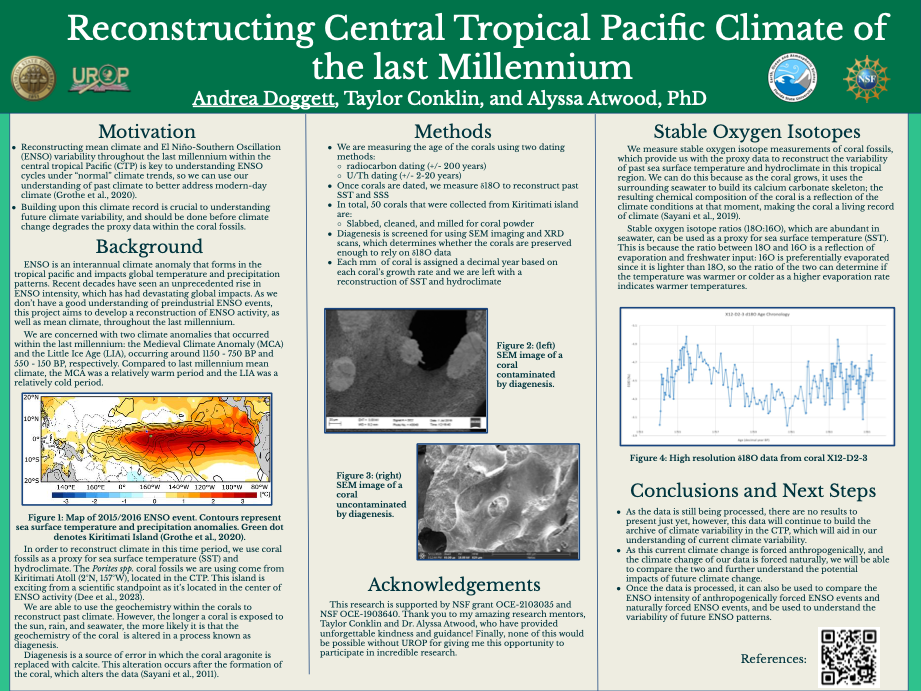Research Symposium
24th annual Undergraduate Research Symposium, April 3, 2024
Andrea Doggett Poster Session 1: 9:30 am - 10:30 am /13
BIO
I am in my second year at Florida State University, majoring in Geology. My hometown is Fort Myers, Florida, where my passion for conserving the local ecosystem ignited my interest in environmental studies. This early fascination has shaped my academic journey and overall life perception. I joined Atwood lab as a participant in the Undergraduate Research Opportunity Program (UROP). Currently, I am aiding my mentor, Taylor Conklin, in her research examining the stable isotopes and geochemical tracers found in coral fossils to reconstruct valuable paleoclimate data.
When I have the time, I enjoy spending time in nature doing activities like hiking, kayaking, and other similar outdoor pursuits. I also love being with my friends and family and playing board games!
Reconstructing Central Tropical Pacific Climate of the last Millennium
Authors: Andrea Doggett, Taylor ConklinStudent Major: Geology
Mentor: Taylor Conklin
Mentor's Department: EOAS Mentor's College: Florida State University Co-Presenters:
Abstract
Reconstructing mean climate and El Niño-Southern Oscillation (ENSO) variability throughout the last millennium within the central tropical Pacific (CTP) is key to understanding how current anthropogenic forcing will affect climate trends in the future, both within this region and globally. Using Porites spp. coral fossils from Kiritimati Atoll (2°N, 157°W), we collected quantitative, high-resolution paleoclimate data for this previously understudied island in the CTP. Stable isotope and trace element composition measurements of these coral fossils provide us with the proxy data we need to reconstruct the variability of past sea surface temperature and hydroclimate in this tropical region. These reconstructions of the last millennium climate focus on El Niño/La Niña cycles during two specific climate anomalies: the Medieval Climate Anomaly (MCA) and the Little Ice Age (LIA), occurring around 1150 - 750 BP and 550 - 150 BP, respectively. The ratio of stable oxygen isotopes (δ18O:δ16O) is used as a proxy for temperature, as it reflects evaporation and freshwater input; since 16O is preferentially evaporated, and evaporation is increased with increased temperature, subtropical and tropical areas tend to have a greater abundance of 18O compared to 16O. However, there are many extraneous variables to control for with δ18O, so we also collect Sr/Ca and Sr-U ratios within the coral matrix to correct for these variables. Building upon this climate record is crucial to understanding future climate variability, and it needs to be done quickly before climate change degrades the proxy data within the coral fossils.
Keywords: Paleoclimate, Coral, ENSO, Climate Change


